What is the most economical heating. Heating your home with electricity: the most economical way, a few tips
Owners of private houses for various reasons choose heating with electricity. Unfortunately, of all existing methods, it is considered the most expensive. Therefore, the question of how to reduce the cost of heating a house with electricity is more relevant than ever. We will consider the most economical way in more detail by comparing some types of heating systems.
Often, houses built on private plots are not connected to energy networks: gas, solid fuel. In such cases, the organization of heating with the help of electricity becomes the only way out.
For example, many people install all kinds of heaters, stoves in the house, if the main system is not working yet. Do these methods have clear pros and cons? Let's look into this in more detail.
Heating private houses with electricity: undeniable advantages
- Ease of installation electrical sources heat.
- The ability to quickly adjust the temperature to the desired level.
- Saving energy consumption.
- Mobility of heating sources (in case of using mobile radiators).
- The ability to choose the type of convector for the interior of the house.
- Environmental friendliness - oxygen is not removed (not burned) from the space of the room, there is no danger of harmful emissions.

Cons of heating from the mains
- The high cost of electricity services.
- If you need to create high voltage, you will need to purchase and install an energy distributor.
Note! As you can see, the disadvantages of this method less than advantages, and all of them are associated with financial expenses.
But if there is simply no other way out, for example, centralized networks are not connected to the area remote from the city limits, then the organization of heating with the help of electricity becomes an indispensable option!
Related article:
At present, the production technology electric heaters expands and improves, thanks to which the economical electric heaters new generation. We will talk about them in this review.
Types of electric heating in a private house
Most often, the need for a heating system with the help of electricity arises precisely in private homes.
The latest systems for this type of room heating differ in:
- principles of work;
- sizes;
- types.
Interestingly, not all of them require a large amount of electricity! Let's figure out how to heat houses with electricity cheaply.

Water heating and electric boiler
It's habitual heating circuit, through which water runs, acting as a heat carrier. However, the heating of the liquid in the circuit is started by an electric boiler for heating a 220v house.

Hence and certain features equipment:
- The system should only be closed.
- A membrane expansion tank is required for uniform heating of the house.
- Needed from time to time forced circulation water in the circuit to reduce energy costs.
The functioning of this system is impossible without the use of a boiler, which can be of 3 types:
With heating element
TEN works on liquid - conductor electric current heated by the resistor. For such devices, it is necessary to additionally purchase waterproof and insulated protection, which, unfortunately, negatively affects the power of the structure.

On average, the performance of boilers with heating elements is from 3 to 50 kilowatts. At the same time, low-power varieties work stably from a single-phase network, but powerful ones will require three phases. The appearance of such boilers depends on the layout of the heating elements.
Characteristics:
- The undoubted advantages of the device include its low cost.
- But it is directly related to the inability to save electricity, while the heating element itself is not capable of a long service life.
- Due to constant use, salts are deposited on the heating element, which prevent its stable operation, and then contribute to its breakdown, which contributes to frequent shift details.
Note! If there is little water in the equipment, the heater fails very quickly, so the liquid level must be constantly monitored.
Customer Feedback:
Miroslav, Perm. Purchase - boiler Protherm 12 K: “At first, a friend bought such a boiler, he was satisfied with it, so I bought an already proven model. It's been running for 2 years now and it works flawlessly. However, I do not recommend taking the boiler without the Thermolink-S regulator, because the device will work uneconomically. I bought it separately, installed it, and the advantages of the boiler increased significantly with it.
Pros: small in size, perfectly suited to the interior of the house.
Flaws: slightly noisy when running.
Elena, Moscow. Purchase - boiler Protherm SKAT 24: The device is very pleasing, but it is not clear why in Russia our manufacturers do not make boilers of the same excellent quality. And Protherm, roughly speaking, I bought and forgot - it doesn’t cause any problems at all!
Pros: copper heating elements in the design, which instantly improves the quality and service life of the device. I like the soft start - the device heats up with a delay, which, I think, also affects how long it will work without interruptions. The boiler has its own circulation pumping apparatus, which is almost inaudible in operation. And you can turn on all the heating elements at once so that the heating occurs faster.
Minuses: per European quality you have to pay, so the price is high. And you also need to connect the device if there is one that protects against power surges, otherwise the boiler will not be accepted under warranty in which case.
With electrode functioning system
The system is very different from the previous scheme. So, heat is generated due to frequency fluctuations in variable networks - they cause ionic vibrations in the electrolyte, which heats up because of this.

The boiler is, in fact, a body and 2 electrodes located in a coolant - electrolyte or conductive liquid. In the role of this coolant, ordinary antifreeze can act.
Advantages:
- Such devices are compact.
- Light in weight, affordable, but have a high heating power. They can be grouped, include only one or all at once.
- And one of its main advantages is resistance to voltage drops, which is especially relevant for houses with old wiring.
But at the same time, the electrode system has disadvantages:
- unstable power level;
- extreme dependence on the composition of the conductive substance and its temperature;
- requires strict adherence to the proportions of the solution and its purity;
- incorrect "reaction" to adjustment and automatic control.
Russian electrode boilers for heating a private house, price range:
| Models "Galan Hearth" | power, kWt | Cost, rub. |
|---|---|---|
 2-N 2-N | 2 | 3650 |
 3-N 3-N | 3 | 3800 |
 5-N 5-N | 5 | 3850 |
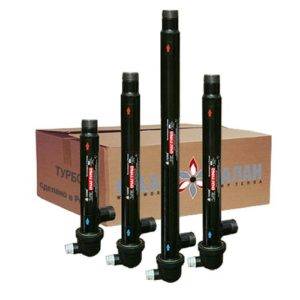 6-N 6-N | 6 | 3900 |
| Models "Galan" | Cost, rub. |
|---|---|
 Geyser-9 Geyser-9 | 7200 |
 Geyser-15 Geyser-15 | 7500 |
 Volcano-25 Volcano-25 | 7550 |
 Volcano-36 Volcano-36 | 10200 |
 Volcano-50 Volcano-50 | 12300 |
User reviews of electrode boilers:
Sergey, Perm: Each heating season requires new electrodes, which is considered a very laborious task. The manufacturer assures that if you adhere to all performance characteristics the device will last a long time.
Natalia, Riga: I purchased the Vulkan-25 model. We often have to dismantle the boiler and clean it. If the plates are not cleaned in a timely manner, the thermal conductivity decreases. The manufacturer recommends first of all to pay attention to the quality of the coolant.
Pavel, Yekaterinburg: Huge costs for electrical energy, according to our capabilities. It is necessary to constantly maintain the recommended temperature and check for heat leaks from the house.
Induction heating boilers
If the question arises of how to heat a house with electricity economically, then this is one of the best options. Today it is the most popular and technically perfect type of electric boiler.

It works like this: in the center of the device, a primary winding is installed, capable of passing an electric current, which provokes voltage in the secondary winding section. It, in turn, consists of a circuit of pipes with a coolant. Due to the fact that there are no vulnerable nodes in such a device, the conductors of electricity do not come into contact with the heat-conducting carrier in any way.
The induction boiler can work stably for several decades! This is an economical device - it can be used to reduce energy costs by up to 40%, when compared with a heating element or electrode "brother".
Note! The device has only three conditional drawbacks - noise from small vibration, the massiveness of the design itself and its relatively high price.
Simple electric boilers for heating private houses: average prices
Heating a house with electricity: the most economical way is infrared
Along with the boiler heating system, the infrared method is especially popular today. Special heating plates are installed in the house, in which the emitter draws in electricity and converts it into an infrared wave, and then transmits it. The waves from the heater are in continuous motion until they "collide" with some opaque object.
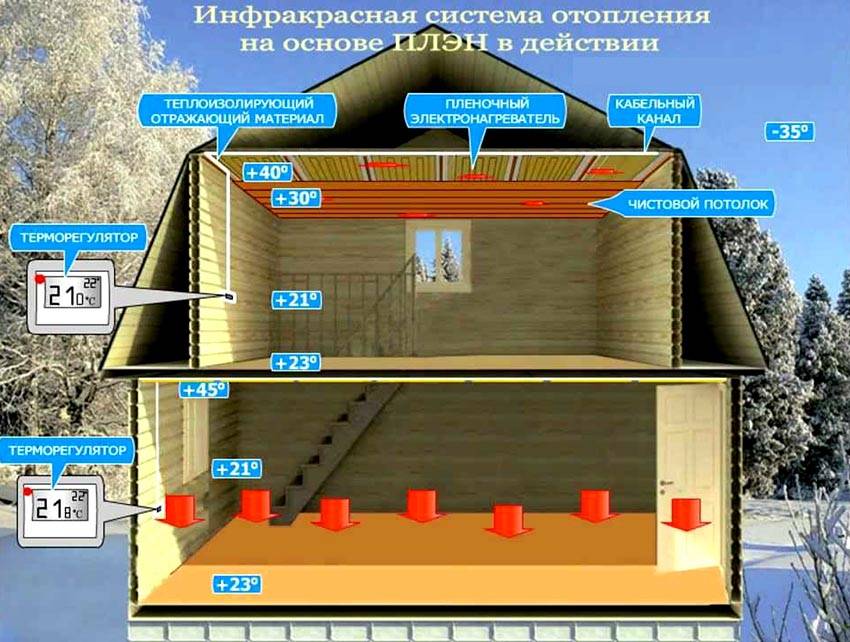
Plates are usually fixed on the ceiling or walls. However, it should be understood that it rarely acts as the main heating system for a large private house and is more often used as an addition.
Infrared waves quickly fill the room with heat, and then automatically turn off - this is possible thanks to a special independent system automatic control.
Note! This type of home heating with electricity is the most economical way, because it does not spend more electricity than necessary.
This option has only 2 drawbacks:
- Expensive equipment (but at the same time it consumes electricity economically!).
- Strict direction of heating from the plates to the nearest parts of the room.
Convector heaters
These heating devices are similar in function to conventional radiators - convectors heat up themselves and transfer heat through the air. However, there is no coolant inside them, therefore pipes are not required for them. Instead of a coolant, heating elements are built into the convectors (the advantages and disadvantages of this element were mentioned above), and cold air climbs through the bottom of the device.
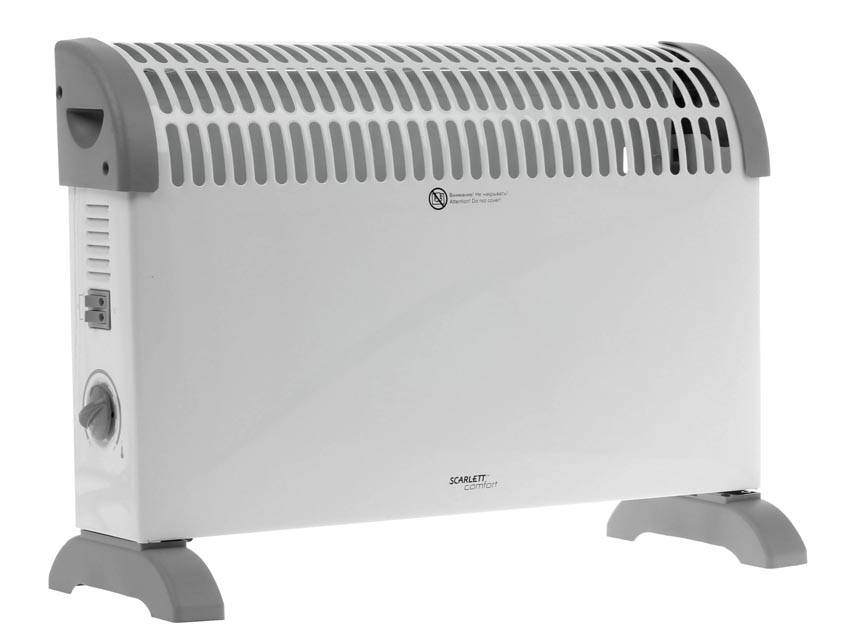
One of the essential advantages of the equipment can be called quiet operation, which is especially important for those who spend most of their time at home. But convectors also have a drawback - this is low efficiency. Electric convectors absorb a significant amount of electricity.
Warm floor
These electrical systems they work on the basis of conductors with a resistor, through which an electric current passes, due to which they are heated.

The "warm floor" system is a cable that can heat up, which fits into the screed or under the floor tile. The cables consist of one or two cores, they can be safely laid directly into the adhesive base of the appropriate thickness.
Cable "warm floor" has only one, but significant disadvantage- if one of the sections of the structure is suddenly damaged, the entire system that is located behind it completely fails.
Every owner wants to properly manage the budget for the construction and home improvement. This means spending as much as possible. less money to get the desired result. With regard to our topic - to make heating in your house cheap, but at the same time not to lose either in warmth or in reliability. What can you save and get the most for the least money? Let's try to guess.
Cheap heating: Save on the purchase of equipment
A significant part of the cost heating system constitute equipment, accessories and expendable materials . You can buy equipment from expensive luxury brands to very cheap generic equipment from an unknown Chinese manufacturer. The main thing is to be aware to what level it makes sense to save without sacrificing reliability and safety.
Example 1: one of the cheapest brands of heating boilers is Russian AKGV. Prices for these boilers start from 10 thousand rubles. However, when buying the lowest cost boilers of this brand, one must keep in mind that, firstly, expansion tank and the pump may not be included in the kit, and you will have to pay for them separately. And, secondly, they may have relatively large heat losses.
We recommend opting for more expensive boilers of this brand, having the best complete set. Or consider other brands. For example, Boilers Baxi have much lower heat losses due to the peculiarities of the boiler design, they are included necessary equipment and built-in automation, which gives additional savings when servicing.
Example 2: many people prefer to buy appliances, including boiler equipment, on the markets. Indeed, prices there are usually lower than in specialized stores. However, official installers most likely will not undertake to install such a boiler at all - they prefer to work only with manufacturer's official representatives. And if you hire a couple of "specialists" in the same market, you will have to bear all the risks. At the same time, when ordering the services of a certified company for the purchase and installation of equipment, you pay more, but you don’t have to worry. You will be provided with a guarantee for both equipment and manufactured installation work. And besides, if you wish, they will take the system for a maintenance contract.
Another source of savings is hunting for special offers and sales. This method is especially effective for the most expensive units (for example, a heating boiler). But there is no guarantee that when you go shopping for your heating, this tempting offer will be waiting for you. If you're willing to put away the equipment at home to save money, this method is for you.
Finally, you can bargain. To do this consciously, you can try to figure out what the difference between the entry and exit prices of the seller is, and try to reduce it in your favor.
Pipes, radiators and other accessories
 The most inexpensive piping system from the boiler to the heating appliances is single-pipe (pipe goes in a circle, and returns to the boiler).
The most inexpensive piping system from the boiler to the heating appliances is single-pipe (pipe goes in a circle, and returns to the boiler).
Cheapness is achieved simply - due to the footage of the pipes themselves, which, respectively, is two times shorter than with two-pipe system. However, the quality of heating may decrease in this case - for example, the “farthest” battery will be colder than the rest (). For pipe laying, it is advisable to use propylene- one of the most economical and at the same time reliable materials.
From heating batteries, for country houses with them not so high pressure in the system, and controlled water quality, usually suitable a large number of types of radiators. You can choose both style and price. Speaking of economy class, aluminum and steel radiators usually noticeably cheaper than their bimetallic "brothers" (from 280-300 rubles per section), and at the same time they are in no way inferior to them in terms of appearance ().
cheap home heating: Savings on installation work
Usually, the cost of installation is calculated as 30-50% of the cost of the installed equipment. Therefore, your costs will be partly due to the amount of previous expenses.
It is quite difficult to come up with something else to install heating cheaply. You can hire a company with a reputation and average market prices, and then sleep peacefully. You can hire a cheaper company and close your eyes to some flaws in your work. Or you can hire a group of guest workers who, upon completion of work, will disappear from your field of vision, and all hidden defects in the work will become entirely your risks. Sometimes - with rather unpleasant financial consequences. So, one of the most popular orders from our company is the service « - which often includes the correction of other people's defects.
Home to help
Another way to save on heating system - insulate the house so as to minimize heat loss. At the same time, it will decrease required power heating system, and, therefore, the cost of components. The main thing is not to forget that home insulation will also require costs, and compare these costs with savings on heating so as not to overpay, but for a different system.
conclusions
To find out exactly how you should (or should not) save money, it is best to use company council, which will build your heating system. And if you are not sure of their objectivity - hire for a one-time fee outside specialist for a consultation.
Running away from the bustle of the city, people are trying to buy or build a house away from civilization. But they are faced with the fact that often the main gas pipeline is not connected to such remote places and it is necessary to look for ways that will provide warmth and comfortable living in country house. There are many heating options country house, but in this article we will answer the most important question that interests everyone, without exception, is it cheaper to heat a house?
The following are the most popular types of fuel:
- Firewood is normal.
- Coal.
- Eurowood.
- Electricity.
- Liquefied gas, in cylinders.
- Diesel fuel.
What kind of fuel will be appropriate in a particular building depends on the operating conditions of this building, the price of fuel and ease of use.
Fuel selection conditions:
- Fuel price.
- The price of the heating system and its installation.
- The cost of maintenance of the heating system.
- The air temperature of the cold season in the region.
- Availability of communications.
- Possibility of fuel delivery.
- Purpose of the building: this place permanent residence or a place of temporary residence for recreation or work.
- The presence of heat loss and the degree of thermal insulation.
- Ease of operation of the heating and fuel system.
- Availability of a certain type of fuel in a given region.
For right choice most effective form fuel, it is necessary to carry out an appropriate calculation, which will take into account the efficiency of this heat source, heat loss, area and volume of the heated room.
All units of measurement must be reduced to a common denominator. It is most correct to use kilograms.
Comparative analysis of the fuel used for a private house
To find out what is cheaper to heat a house, you need to compare all available types of fuel.
Heating with conventional wood
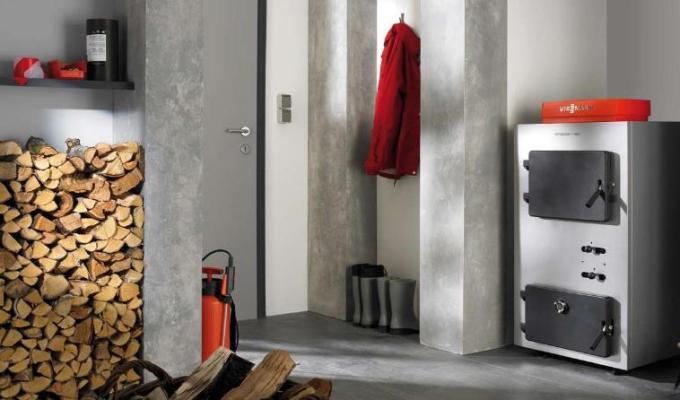
A simple and easily accessible way of heating. It is especially beneficial if a wood-burning stove or stove (coarse) remains in the house. In this case, there is no need to arrange an additional heating system, unless, of course, it copes with its functions. Otherwise, it is necessary to install a solid fuel boiler and install heating pipes.
If the house is located near a forest or planting, then it makes sense to use this particular heating method.
Pros and cons of solid fuel boilers
Advantages:
- Safety in operation subject to compliance with safety regulations.
- Versatility. Ability to use different types of fuel.
- The ability to convert the boiler to different conditions work.
- In addition to heating the room, they can perform the function of heating water.
- Easy to operate.
Flaws:
- A large mass, and in some cases a large volume of the boiler.
- Periodically, you need to clean the boiler, and this is a dirty and dusty job.
- It is necessary to monitor the presence of fuel and add it.
The main parameter is efficiency (coefficient of performance), which is 75% in solid fuel boilers.
In addition to such boilers, there are modern solid fuel stoves or fireplaces that do not require piping, but the amount of heating is limited.
Firewood is the most easily accessible and cheap look fuel, however, if a large percentage of the population switches to heating with wood, then their cost will rise sharply.
The tree differs from each other in the characteristics of the species and this affects its quality as a fuel.
- Conifers (spruce, pine, cedar, thuja). Such firewood is characterized by a high resin content, which ensures a long combustion period with a high heat release. But at the same time, the combustion of firewood is accompanied by an abundant release of smoke.
- Soft rocks (willow, poplar, aspen, linden) burn quickly, emit little heat and do not form heat, and are ineffective for heating.
- Hardwoods (oak, beech, hornbeam, elm, acacia, birch) are most effective. They burn for a long time, emit a large amount of heat and form a long smoldering heat. Such rocks will provide a stable high temperature for a long period of time.
Pros and cons of firewood as fuel
Advantages:
- Availability.
- Not a high price.
- Create a comfortable microclimate in the room.
- Independence from main communications.
Flaws:
- Additional storage space required.
- The need to regularly add firewood.
- The need to periodically clean the furnace or boiler.
- Requires the installation of a smoke exhaust pipe.
- High labor costs (firewood needs to be chopped and stacked).
Heating with eurowood

Eurofirewood are briquettes or pellets made from pressed dry wood. different breeds. Sawdust, shavings and other wood waste pressed into comfortable shape. In the manufacture of this type of fuel, adhesive resins are not used and, due to this, soot is not formed.
Eurowood advantages:
- During combustion, a large amount of heat is released, more than when using hardwood of the corresponding mass.
- Long burning time.
- Low moisture content.
- It is convenient to kindle in the oven.
- The level of carbon dioxide emission is lower than in conventional firewood.
- After combustion, a small amount of waste remains.
The disadvantages include:
- The need for additional storage space.
- The boiler may need some modification.
The quality of briquettes depends on the following factors:
- Pressing density.
- The absence of foreign impurities.
- Compliance with production technology.
- The degree of quality of production equipment.
The main advantage of such fuel is the saving environment in particular forests. In any area where wood is used for production, there is a lot of waste that can be used for.
Heating with coal

Coal is widely used, especially in areas where there is no gas pipeline. For use stone and brown coal. Coal divided into gas, long-flame and anthracite. When burning long-flame coal and gas, a lot of smoke is released. Anthracite has a low level of moisture, which ensures the release high temperature during combustion.
Special boilers are used to burn coal. Their feature is that, in addition to coal, other types of solid fuel can be used.
Table for calculating the choice of a modern coal-fired boiler.
Pros and cons of using coal
Advantages:
- Charcoal burns much longer than firewood. Due to this, it will be necessary to add fuel less often.
- long heat dissipation process.
- Coal can be used in various systems heating.
- All types of coal are suitable for heating, but with different efficiency.
Flaws:
- In the case of large fractions of coal, they will need to be crushed.
- Coal dust pollutes the room.
- The boiler needs to be cleaned periodically.
- Requires a special room for storing coal.
Heating with liquefied gas

If the supply of liquefied gas cylinders is organized to this area, then it is possible to use them to organize heating in the room. But the gas consumption is significant and a large number of cylinders are required.
There are the following ways to save gas:
- Modern boiler that saves thermal energy, can reduce gas consumption by four times.
- If you install cylinders side by side, you can save on the cost of piping.
- Installing a timer, which at night will reduce the air temperature in the room to 15 ° C, can significantly save gas consumption.
- To free up space, it is advisable to install a gas tank on the site.
Heating with diesel fuel

In addition to all of the above, it is possible to use the boiler on diesel fuel. In order to determine the feasibility of installing such a boiler, it is necessary to consider its qualities.
Pros and cons of diesel boilers
Advantages:
- High efficiency.
- A large assortment.
- Safer than gas.
- Minimal use of electricity, only for the operation of automatic appliances.
Flaws:
- The smell of solar.
- You can not use low-quality diesel fuel.
- High fuel consumption.
- High price.
Heating with electricity

Each settlement is connected to the power supply and is the easiest to install. This explains the popularity of this type of space heating.
The most popular types of electric heating:
- Electric heaters (convectors, infrared heaters).
- Electric boilers.
- Warm floors (cable, infrared film floors).
Advantages electric heating:
- Ease of operation.
- High efficiency.
- Doesn't make noise.
- The most accurate temperature control.
- No special storage space required.
- No harmful substances are emitted during the heating process.
- Ease of installation.
Disadvantages of electric heating:
- High consumption and high cost.
- In the event of a power outage, the house will cool down.
- The old one may not withstand and burn out from the high load.
- Convectors heat the air, and it takes a lot of time and expense to heat it. If the house is not thermally insulated, then the heat will quickly leave the room.
- Infrared heaters heat the surface, and it is comfortable only in the area of the infrared lamp.
The problem with high energy consumption can be solved by installing an infrared floor heating. It creates a comfortable microclimate at the height of human growth.
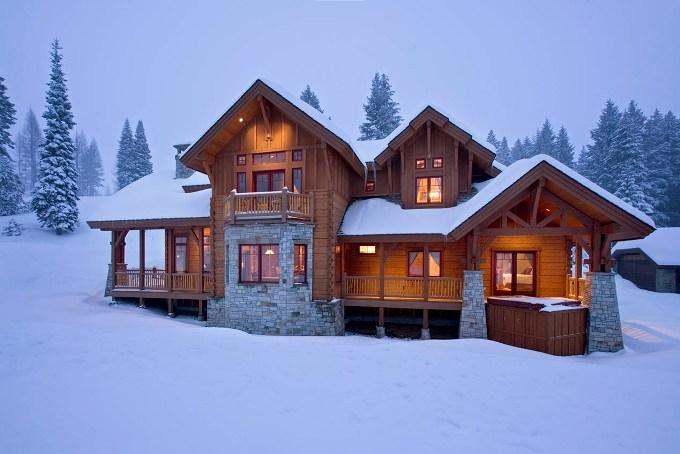
Choice best way heating a country house comes down to comparing all types of fuel and specifications heating systems.
Fuel comparison table:
| Heat source | boiler efficiency | calorific value. 1 kg per kWh |
Need for a house 100m 2 | Seasonal costs |
| Firewood | 70 | 4,5 | 25000 | 25000 |
| eurofirewood | 70 | 5,5 | 25000 | 34000 |
| Pellets | 70 | 5,2 | 25000 | 33750 |
| Coal | 90 | 7,7 | 25000 | 29250 |
| diesel fuel | 75 | 11,9 | 25000 | 71500 |
| Liquefied gas | 75 | 13 | 25000 | 65500 |
| Electricity including night tariff | 99 | 25000 | 112500 | |
| Electricity. Two tariffs | 99 | 25000 | 89131 | |
| Electricity. One tariff | 99 | 25000 | 59300 |
* - trunk gas was not taken into account in this calculation, since it is out of competition.
After doing all the calculations and comparing the positive and negative sides all types of heating, we will find out the cheaper it is to heat the house and it turned out to be ordinary firewood. It is advisable to install . The one that is more profitable and more convenient in a certain period will be operated.
For private house owners big choice individual heating systems. Given the constant increase in the cost of energy resources, each owner is trying to find more economical heating systems. The most common types of heating are: gas, electric and wood.
The energy efficiency of this type of heating is small, because the main gas is not even connected to some private houses. More economical option can be application gas boiler that can be heated different types waste. But it is undesirable to leave it unattended for a long time.
Sometimes, in order to save money, gas convectors are used by installing them on the walls of the room. They are selected based on the area of \u200b\u200bthe room with the calculation of 1 kW of power per 10 m 2.
Options for reducing gas costs:
- additional insulation of the house;
- use of thermal valves;
- compliance with a certain temperature regime;
- installation of automation;
- installation of propane sensors.
Important! Subject to the above points, you can reduce gas consumption by up to 30%.
Electric heating
H2_2This type heating system is considered the most environmentally friendly. Electric energy-saving heating systems are presented in the following types:
- systems of "heat-insulated floors";
- thermal panels;
- quartz modules;
- water heating using electric boilers.
The system "warm floors" is one of the types of electric heating. In turn, warm floors can be made of cable, film, or carbon rods. IR film is the cheapest of these systems. The principle of operation is to place flooring electric wire or film and installation circuit breakers. The average consumption of electric underfloor heating is 120 - 180 W/m 2 , while the system does not work around the clock and there is no need to cover the entire floor area with heating elements.
The main advantage of underfloor heating is the presence of a special thermostat that will control the heating power. Thus, there is a saving of 15% of electricity.
Thermal panels are infrared devices, which are additional heating of residential premises. They are presented in the form drywall sheet having several layers of electrical insulation. The principle of operation of the panels is to release waves that heat the air and objects in the room. In the future, heated objects will accumulate heat and transfer its excess to the space of the room. Infrared panels are connected to ordinary euro-sockets. One of their advantages is easy installation, they are attached to the wall and do not spoil general form premises.
The most important advantage of using thermal panels is 40% savings electrical energy. Also, such devices do not dry the air and are considered environmentally friendly.
 Quartz modules are special heaters, which are made in the form of a monolith based on quartz sand. Such arrangement of the module provides its high heat capacity and long term operation. Quartz heaters save about 25% of electricity, since one such module consumes only 0.4 kWh. The heating area of one device is about 16m 2 . The main advantages of these devices are their versatility and affordable price.
Quartz modules are special heaters, which are made in the form of a monolith based on quartz sand. Such arrangement of the module provides its high heat capacity and long term operation. Quartz heaters save about 25% of electricity, since one such module consumes only 0.4 kWh. The heating area of one device is about 16m 2 . The main advantages of these devices are their versatility and affordable price.
The most efficient and economical systems heating is water heating. Its device consists of an electric boiler, radiator and pipelines.
Advantages of water heating:
- Profitability. Allows you to save up to 20% of the total amount of electricity consumed;
- Safety;
- Easy to operate;
- Lack of open heating elements that dry the air.
Fact! Water heating electric boilers can heat a house up to 100m 2 in area.
wood heating

Boiler long burning for energy efficient heating firewood
Replaced large ovens solid fuel boilers, the energy efficiency of which has the highest level. There are universal and highly specialized boilers. When it comes to energy saving, it is better to use universal devices. This is due to the fact that such a boiler has an enlarged combustion chamber, which allows you to extend the duration of the fuel.
Boilers of long burning can work continuously for about a day.
Such a boiler cannot be left unattended for a long time, but for houses devoid of centralized communications, wood heating- this is the best and most economical way of heating.
In addition to the above heating systems, there are other heating methods that involve extracting heat from the environment.
solar system
 This is a special device that solar radiation into other types of energy (thermal, electrical, etc.). The working element of the entire system is a solar collector, which directly processes energy. The use of solar plants as a heating system makes it possible to significantly save on utility costs. The principle of operation is to heat the coolant to 140 ° C and distribute heat through the pipeline system in which water will be heated.
This is a special device that solar radiation into other types of energy (thermal, electrical, etc.). The working element of the entire system is a solar collector, which directly processes energy. The use of solar plants as a heating system makes it possible to significantly save on utility costs. The principle of operation is to heat the coolant to 140 ° C and distribute heat through the pipeline system in which water will be heated.
Most often solar collectors installed on rooftops where they are most exposed to the sun. The main advantage of using solar systems is significant savings in gas and electricity. As for the disadvantages, they are the complexity of installing the system and its high cost. The price of installations primarily depends on their performance. For example, a solar system with a capacity of 300 liters per day costs about $1,500. The whole installation can pay for itself in three years.
Heat pumps
The essence of the operation of these devices is to extract heat from the environment: soil, rivers, lakes, air, groundwater etc. Heat pumps reduce heating costs by 70%. The advantages of the device are to provide high level comfort at low operating costs. The disadvantages of using these heaters are their high cost and relatively short service life, about 20 years.
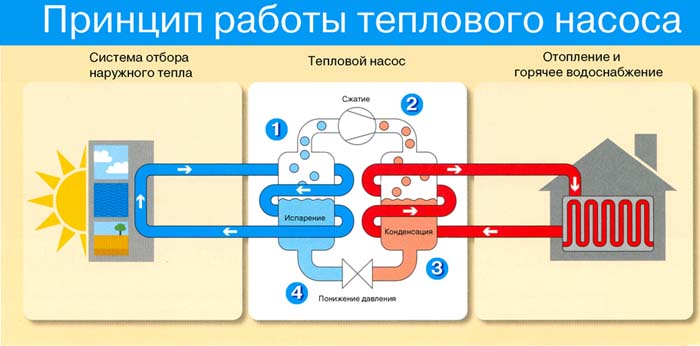
How a heat pump works



















